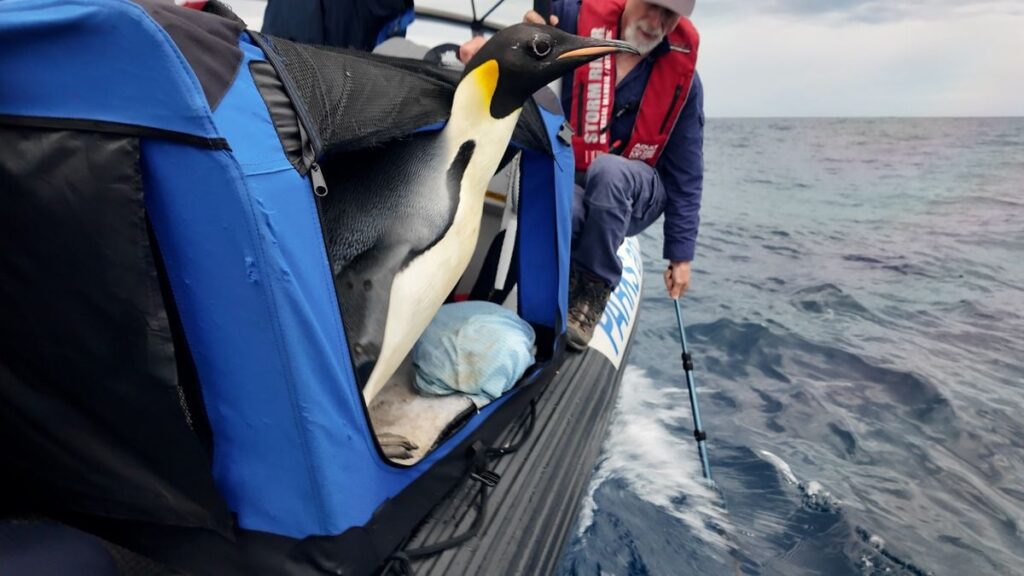Gus did not hesitate to belly flop into the ocean.
DBCA / Miles Brotherson
The emperor penguin that made global headlines after waddling ashore on a beach in Australia has been released back into the wild.
Surfers spotted the out-of-place bird on Ocean Beach in Denmark, Western Australia, on November 1. Somehow, the juvenile male had ended up more than 2,100 miles from his home in Antarctica.
Carol Biddulph, a registered wildlife caretaker, took the black-and-white bird to her home, where she has a dedicated penguin enclosure. The three-foot-tall penguin was malnourished and weighed just 47 pounds, which is well below the average weight of around 88 pounds for the species.
For the last three weeks, Biddulph and her husband, Graham, have been carefully nursing the bird back to health, according to a statement from Australia’s Department of Biodiversity, Conservation and Attractions (DBCA).
At first, Biddulph didn’t know what to call the penguin—or whether to name him at all.
“I really didn’t know whether he was going to make it to begin with because he was so undernourished,” she says in a video shared with media outlets by the DBCA.
But once it seemed like the juvenile would recover, Biddulph started brainstorming. She thought about historical emperors—and her brain landed on Roman emperor Augustus “for some crazy reason,” she adds.
“[The] shortened version of Gus just seemed to suit him. So that’s what it is,” she says in the video.
By the end of his recovery, Gus was eating roughly 20 pilchard fish three times each day.
DBCA / Miles Brotherson
Biddulph helped Gus regain weight through a “gentle process of refeeding him, not too fast, not too slow, just right,” she says. She and her husband started by giving him fluids, then moved on to a slurry. Eventually, they began feeding him whole fish.
Once he’d made a full recovery, Gus was eating roughly 20 pilchard fish, also known as mulies, three times each day. Before his release, he weighed about 55 pounds and was in a “much chunkier shape,” Biddulph says.
As he was regaining his strength, Gus enjoyed standing next to the big mirror in his enclosure. Since penguins are social birds, he might have thought his reflection was a fellow emperor penguin.
“I find for other species of penguin that I have in care, the mirror is a must-have, especially when I’ve only got one in at a time,” says Biddulph in the video. “When there’s two or three [penguins], it’s great, they can bounce off each other, but when you’ve just got one, they just need that comfort of knowing they’ve got a buddy.”
The emperor penguin liked to stand next to a big mirror in his enclosure.
DBCA / Miles Brotherson
On the day of Gus’ release, he was placed into a ventilated pet carrier with an ice pack and loaded onto a small DBCA vessel. With Biddulph, her husband, a veterinarian and a wildlife officer on board, the boat sailed out of King George Sound in Albany, Western Australia.
Once they reached an undisclosed location in the open Southern Ocean, the caretakers placed the carrier on the edge of the boat and opened one side. Without hesitating, Gus belly flopped into the water below with a splash, took a drink and began swimming.
“Magnificent. He just knew where he was supposed to be, didn’t give a backward glance and just disappeared,” says Biddulph in DBCA footage captured on the boat. “It’s just amazing. … He was ready for it.”
After jumping into the water, Gus took a drink and swam off without looking back.
DBCA / Miles Brotherson
For her part, Biddulph says she enjoyed taking care of Gus and will miss him. But at the end of the day, she’s thrilled to see him back where he belongs.
“I got into wildlife care … not to make these birds my pets,” she says. “I want birds to be free, and every one that we care for that goes back to its natural environment means that we’ve done our job well.”
It’s still a mystery as to how and why Gus ended up so far from home in the first place. Experts believe he may have been looking for food, then got caught up in a current.
To ornithologists, Gus is what’s known as a “vagrant.” Especially during the spring and fall migrations, it’s fairly common for birds to end up in unusual places—and their appearances are always a treat for birdwatchers.
Some vagrants get blown off course by storms, while others have been known to catch rides on boats. Since birds use Earth’s magnetic field to navigate, it’s also possible that disruptions to that field due to space weather might cause them to lose their bearings. But vagrancy largely remains a mystery to scientists.
“If a species showed up all the time, we’d just consider that to be part of their range,” says Casey Youngflesh, a biologist at Clemson University, to National Geographic’s Tatyana Woodall. “Truthfully, we still don’t understand a lot about the marine environment and don’t have a good idea where many animals spend their time.”


